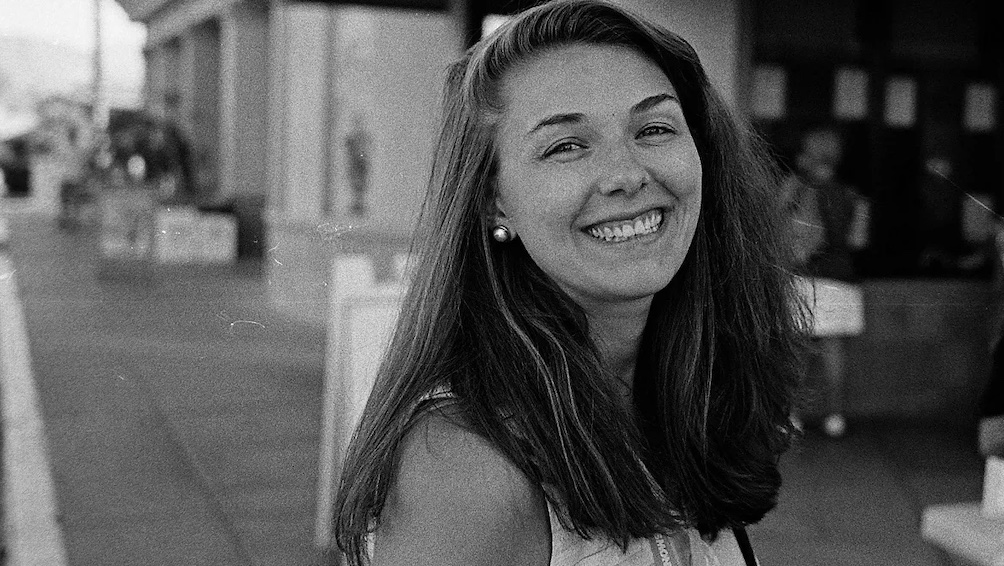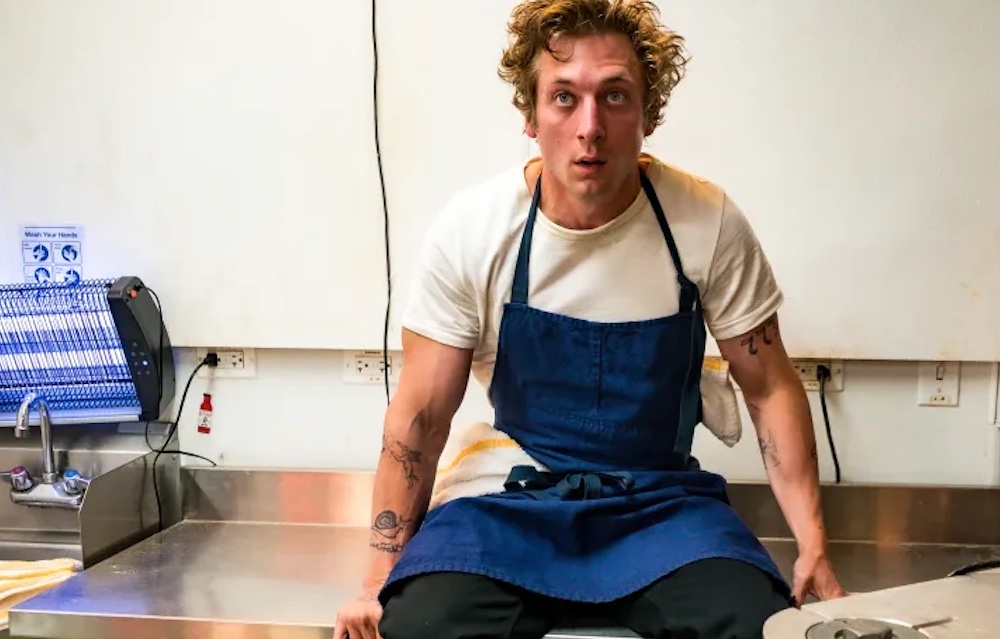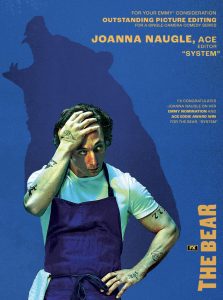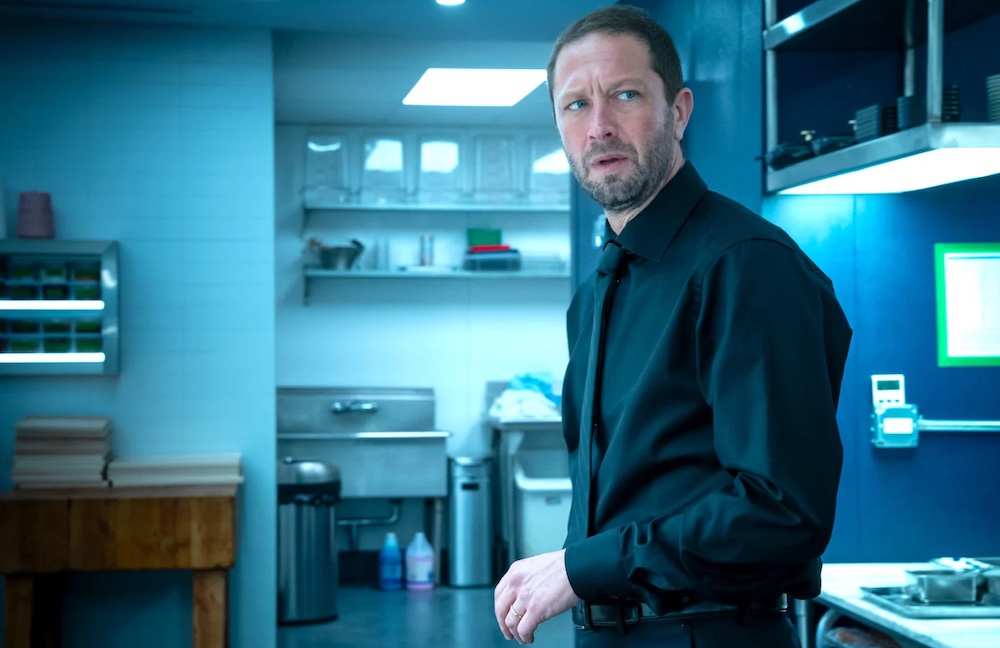
The Bear is a meditative show that’s angry and fast. Creator Christopher Storer‘s FX drama, led by showrunner Joanna Calo, runs and expects its audience to keep up. It offers an exhilarating, sometimes dizzying, and unnerving experience.
This relentless pace aligns nicely with the chaos, both internal and external, that Carmy (Jeremy Allen White) and the rest of The Beef’s team face daily.
While the show often maintains an unrelenting tempo, it also knows when to slow down and speak softly instead of shouting. Then again, even when the characters are screaming their heads off, the show manages to whisper. Editor Joanna Naugle helps orchestrates these contrasts, and the same goes her even-handed approach to the series’ ensemble.
Naugle has been nominated for Outstanding Picture Editing for a Single-Camera Comedy Series. In particular, she earned this nomination for her work on the episode titled “System.” Recently, Naugle talked to Below The Line about crafting for one of the best damn shows around.
Below the Line: Congratulations on your work on The Bear, the Emmy nomination and everything.
Joanna Naugle: Thank you. It’s a really fun show to cut, so I’m glad it’s getting so much love from people and so many people are connecting with it.
BTL: I heard you say in an interview you hadn’t really cut something this fast-paced before, so what were some pacing lessons from season one you applied to season two?
Naugle: I’d cut a first version of the scene and I’m like, “This is so fast, there’s no way it could be faster.” And then Chris Storer, who created the show, and Josh Senior, one of the EPs, was like, “No, it could be faster.” And I’m like, “Can it?” And then they’re always right. It always can be faster and it feels correct once we make it that way.
Even between season one and season two, when I got back, I had to re-remember the pace of the show. It’s much faster dialogue to the point that it doesn’t always sound natural, but that’s intentional. It’s supposed to be these people are so comfortable with each other, they have this pace, and even if it doesn’t always sound realistic, that that’s their world and that’s how they operate. It just adds to this shared history between them, their way of talking with one another, the way of communicating. It’s constant shorthand.
They already perform at a quick pace and then it’s up to me to make it even faster and even more overlapping between lines. Chris is always like, “Shorter is better. Let’s get through as much information as we can in a shorter amount of time.” I love not having to linger on exposition and trusting that the audience is going to figure things out instead of holding their hand. It’s like, “All right, let’s just give them enough to get their bearings and then let’s get into the meat of the story,” which I personally love because it doesn’t feel like we have to do a lot of setting things up, a lot of exposition. It’s just getting to the fun part.

BTL: You don’t linger on exposition, but you do linger a lot on faces.
Naugle: There’s a lot of closeups.
BTL: How is it sitting with the closeups as an editor, just getting the intended effect just right?
Naugle: As I’m watching the dailies, and if I’m watching Carmy, at a certain point I’ll say, “Oh, I wonder how Richie’s reacting to this, or I wonder how Sydney’s reacting to this?” I try to use my gut to say, “Okay, we’ve been on Carmy a lot, but also let’s build up the relationships with people around him by also seeing how people are responding to what he’s doing.” Obviously, that goes for any character, not just Carmy.
I think it creates such a more layered relationship. You don’t always need to see a character finish the line at a certain point. I kind of like jumping onto, “Okay, how is that person being received by the people in the room and is it easing the tension? Is it escalating the tension? Is this person confused or surprised by what they’re hearing or are they comforted by it?”
We have such a wealth of talent in the performances in the show that I love highlighting how much they’re able to convey without words and just watching Sydney’s (Ayo Edebiri) face as Carmy’s telling her something really heartfelt. That’s how you connect with the characters and how you get inside her head.
In the Christmas episode, at that epic dinner table scene, I used so many closeups so we could constantly be tracking how each person was handling the stress of the situation. Richie’s (Ebon Moss-Bachrach) kind of laughing about it at first, but you can see that Tiffany is really uncomfortable by it. It’s setting up all the different dynamics between all the different characters and showing how everyone is reacting to the chaos around them. Just again, adds to that shared history between them and shows who thrives in this environment and who’s experiencing their worst nightmare.
BTL: There are times where the pace really does slow down. “Honeydew” is a great example in season two. How do you want to create a more serene pace?
Naugle: And that was something we really talked about a lot when Adam Epstein, who’s the other main editor on the show, when he came on season one. He saw the pilot and said, “It can’t always be like this, right? It would just be relentless and unwatchable.” We realized that if we’re going at a hundred miles per hour in one scene, if you do that constantly, it’ll lose its effect because you’re just getting used to it. Whereas if we have a long quiet scene that’s then paired with something that’s accelerated, you feel so much more of that energy change.
There’s a long shot in the second episode of the series that’s Carmy scrubbing a floor for a full minute and him leaving and cleaning up, and it feels really slow, and then all of a sudden you’re having a panic attack and it’s flashing to all these different things. And so, I think that moment of catching the audience off guard is what makes those moments land a little bit more.
The “Honeydew” episode is a great example. It’s the first time we’re leaving Chicago. It’s the first time we’re really in Marcus’s (L-Boy) point of view, and he is such a different character than anyone else in the restaurant, but especially Carmy, in that he’s a little bit more meditative, he’s a little bit more introspective, introverted.
We wanted the editing of that episode to reflect that in a way that lingers on certain shots. He has this really long conversation with Will Poulter‘s character, Luca. As the audience is soaking everything up, that’s what Marcus is doing too. Their conversation is all about taking inspiration from the things around you.
We wanted to really make sure that you were feeling that too, seeing the beauty of the city, seeing him try new foods for the first time, trying new cooking techniques and not rushing through that. Because while he’s here, he’s not under a deadline. There will be crazy moments of stress to come, but right now, it’s all about exploring and learning. That was something that Chris and the director Ramy [Youssef] talked about from the beginning, that this should feel like a departure from the pace we’ve set and let things be quiet and still for a moment.
BTL: The show and its pace was so confident from the beginning. The vision was there, no finding your footing, but was there any substantial trial and error in the beginning?
Naugle: Yeah, one of the main things we changed in the edit of the first episode is there’s this major montage that kicks us off. There’s the scene with Carmy and Bear on the bridge, and then pretty soon after, we go into this montage of him and he is cooking the beef and doing the full beef process. He’s going and he’s buying the meat, he’s taking the jeans out of his oven, he’s setting up a Ballbreaker tournament. On top of that, we see all these still images too of him as a child, of the Berzatto family as a child. We’re seeing the B-roll of Chicago. Now, that was something that was scripted as a bunch of different scenes.
And then Chris Storer said, “I want to just start this show off with a jolt of adrenaline, basically be like, are you in or out? This is the pace we’re setting up.” And again, talking about not holding people’s hand through exposition, giving them just enough information to see, okay, this is who Carmy is as a person.
So that took a lot of trial and error because it was almost a house of cards of exactly how much do we need of seeing him cooking, how much do we need to understand why this guy has jeans in his oven? What is he doing with them? What is Ballbreaker? No one’s heard of Ballbreaker before. So there were a lot of layers of things we had to introduce. There was definitely a little bit of trial and error.
We even had a scene that didn’t end up making it into the pilot that was supposed to be Carmy losing his temper with everybody. Chris, to his credit, said, “I think this is too early for this to happen. We haven’t earned it.” So instead, it was supposed to just be more of seeing him come back to this environment, feeling out of place, feeling he has to transform this world into something completely different, but not get to that place that he gets to in episode seven of the first season, where he loses his cool completely and we see that really, really dark side of him.
BTL: The 17-minute long take, right? How’d you pull that off?
Naugle: To be honest, I did very little because I picked the right take and then just let it run. It was actually a one-take.
BTL: Oh, so not a lot of big stitches or anything like that?
Naugle: No, no. I know everyone’s always surprised to hear that, but they just ran it through. I think they did the whole take five times and we used take number two, because they nailed it right out of the gate.
I remember when I first heard they were going to do a oner, and I was like, “I’ve never been more excited to see dailies in my life,” because it was almost like watching a picture lock around the dailies.
They rehearsed it for a full day, then they filmed it for a full day, and then when it landed, instead of doing the conventional thing of like, “Okay, now I’m going to start cutting and trying to build up the tension,” I did a lot more temp sound design to make sure that we could still achieve that feeling of stress that we had set up in the earlier episodes, but without relying on changing the angles to create that energy that we keep talking about that’s so important to the show.
BTL: How did you want to use the temp sound design to create that anxiety?
Naugle: So, what is every possible thing we could be hearing? Is it people outside? Is construction happening next door? We hear the phone ringing when things are getting really chaotic. You hear a timer going off in the oven.
As the episode goes on, we have more and more sound design as things start feeling more and more claustrophobic. And then also the music comes in about maybe five minutes into the take, and then we are steadily building this amazing Wilco song that we timed out just so that it would hit at these certain moments so that as Richie gets stabbed by Sydney, it’s coming in this part in the music that feels like it’s building to this moment.
The team at Sound Lounge, our amazing mixers on the show, were like, “This is the best temp sound design we’ve ever had.” And I was like, “Well, I had a lot of time because I wasn’t cutting,” and they made it even better. They were adding in more and more.
We wanted to hopefully not make an obvious one-take because there were so many other things going on that were listening to with all the different sound effects and taking in everything that was going on. And the fact that a lot of people don’t realize it’s a one-take, I’m like, “Okay, great. We succeeded.”
 BTL: I’m a big Wilco fan. How is it cutting to their music?
BTL: I’m a big Wilco fan. How is it cutting to their music?
Naugle: Chris loves Wilco too. It’s so fun because Chris and Josh Senior, who’s an EP on the show, they’re the music supervisors on the show too. They have a very clear idea of what music they want. At the beginning of each season, they’ll give me a playlist like, “This is the world of The Bear that we’re drawing on.”
Sometimes they have very specific ideas for certain scenes, like, “This is the track for this moment.” And sometimes it’s like, “What do you think it should be like? Why don’t you try out some of the things that we already like?” And there was a ton of Wilco on both seasons, which is so fun.
They’re great because they’re not obviously fast-paced. It’s not an electronic beat or something that’s like, “Oh, this is really going to drive the tension.” But at the same time, that song, “Spiders (Kidsmoke),” has such a great build throughout that as you’re hearing the guitar strings and stuff, it’s a little bit uneasy. It worked so perfectly for that episode, especially because it sounded a little bit off in all their different layering of instruments that also was happening in the kitchen.
BTL: A lot is left unsaid in the show. Some of my favorite moments in season two is when you can see Richie really trying to suppress his instincts, just to be better. When it comes to subtext and the unspoken, how much do you discuss the intent there with the writers to help communicate the unsaid?
Naugle: Totally. No, there’s definitely layers to it. Literally, it’s about people who are putting together a restaurant or working together in a kitchen. But the bigger picture, it’s about teamwork and it’s about collaboration, and it’s about communication styles. It’s about bringing out the best in the people around you. It’s about respecting yourself, respecting each other.
Even bigger, it’s a show about grief, it’s a show about family, chosen family or biological family. Every step of the way, there’s kind of like, “Okay, this is what’s actually happening literally, but this is what we hope everybody can relate to.” This is also the overarching theme of the season. From the beginning of season two, Josh and Chris and [showrunner] Joanna were like, “The theme is every second counts,” and that takes on different iterations throughout the season.
Richie kind of has this bigger transformation throughout the course of the season, and that theme is something that each of the characters appreciates in their own way, and it’s something we see throughout. For Marcus, every second counts. We literally have shots of him setting timers in bakery, and that will take on a new meeting for him later on, talking about time with his mother, every second counts, spending time with her too.
I think we’re constantly trying to say, “Okay, let’s make sure we’re true to the characters in this moment,” but also wanting to speak to these larger themes too, of having community, having support from other people and when things are hard, knowing how to handle your emotions in a way that’s productive, not negative.

BTL: What discussions do you have about cutting the more surreal moments? Again, going back to “Honeydew,” what about when Marcus finds the guy in the fence?
Naugle: That scene is one of the more abstract scenes we have in this season. It was something I talked to Chris and Ramy and Josh about, and what it means to them because so much of the show is also in kitchens, in restaurants, and I think this season they wanted to make an effort to show the characters interacting with people outside of their insular environment.
For Marcus, he is not sure if this guy’s okay and having to do this all through nonverbal communication, trying to find common ground with someone. It’s this moment of showing him having confidence as a fish out of water and relates to this idea of the last conversation he had with Luca before that was like, “You can’t have any creative ideas if you don’t experience life outside of the kitchen.”
I think that was an interesting choice on the writer’s part and on Chris’s part to be like, “Okay, he’s living this kind of quiet, calm life inside the kitchen, and then he goes out and has a little taste of chaos of somebody who’s hurting and he is still able to help them, even if they can’t communicate through a shared language or through a shared experience.” He’s still able to make a difference, help this guy and hopefully feel good about it and something that’s probably going to stick with him for a while.
BTL: Given that the show is largely about communication and process, has your own personal experiences in post-production made you relate to The Bear in a way that helps guide you as you cut it?
Naugle: I think so. I’ve never worked in a kitchen as a chef, but I can relate to wanting to show up to a job and feel creatively fulfilled and do my best and connect with my coworkers and build up the people around me. I think that’s the journey that Carmy has been on; he’s seen people in positions, the position he wants to be, like the really abusive boss he had at the beginning of episode two, and he doesn’t want to be like that.
You see flashes of the person he could become when his temper flares up or when he’s inappropriate to Sydney or very aggressive. I think anyone can relate to that idea of like, “Oh, I don’t want to poke the bear,” so to speak, to use a bad pun. “I don’t want to become the worst version of myself. I want to be the best version of myself, and what does that mean? What do I need around me to find that success?”
For me, the way that everybody is moving really quickly in the kitchen and everybody has their roles and is trying to put out the dishes, we talk a lot about how that relates to a post team, too. Everybody has a specific job. Everyone’s trying to get the episode out the door, and if one person isn’t keeping up pace with everyone else or isn’t as dedicated, or there’s a miscommunication, the same way that that’ll mess up an order, same thing with the show.
Anybody who’s working in a fast-paced environment with lots of different personalities, lots of different creative opinions, lots of different egos and voices, you got to figure out how to navigate that. If you’re working towards a shared goal, appreciate that everyone’s on the same team. Let’s all be kind to each other. Let’s all be understanding of each other.
And if you build up someone else’s confidence, it’s only going to make your life easier and only going to make the final product better. Not losing sight of that is really important, and I think the show does a good job highlighting that.
The Bear is now available to stream on Hulu.





